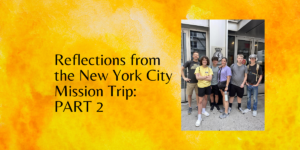Ministry in Daily Life
St. John’s is blessed to have many community leaders in our congregation. One of these is Psychotherapist Jesse Roberts. Jesse is owner of Charlotte Counseling & Wellness. Jesse specializes in grief, trauma, anxiety, depression, life transitions, and LGBT issues. He is a native of Rutherfordton, NC, and has earned the following degrees and certifications: M.A., Ed.S. in Clinical Mental Health Counseling from Gardner-Webb University, NCC, LCMHCA. As Senior Minister, one of my core callings is to equip the people of God to live as Christ’s Church in the world by being Ministers in Daily Life. During these months of pandemic and physical distancing, I am grateful for Jesse, Janet Jones, Dr. Gary McFarland, and others to offer helpful thoughts to equip us as we seek to be better Ministers in Daily Life.
Finding Peace in a Sea of Uncertainty
by Jesse Roberts
In an unprecedented era of physical distancing, it is important – now, more than ever – to give attention to our mental health. We are sailing in a tumultuous sea of uncertainty and the “unknown” often leads us to irrational and catastrophic thinking. For many people, anxiety is at an all-time high and it is imperative that we take care of ourselves – physically, mentally, and spiritually. Here are a few tips for coping with anxiety during the COVID-19 pandemic:
- Stay informed (by accessing reliable sources), but limit screen time. Constant exposure to news and social media about the pandemic fuels panic.
- Express your emotions. Keeping your feelings inside only heightens anxiety. Talk about your fears, your sadness, and your moments of happiness.
- Control what you can – wash your hands, physically distance, sanitize – and accept that there are things outside of your control right now.
- Check on your friends – especially those who are most vulnerable during this time (the elderly, the immunocompromised, those who may struggle with addiction).
- Utilize technology to remain in contact with those you love. Physical distance doesn’t mean social distance.
- Use this time to do things you wouldn’t otherwise have a chance to do – read, catch up on shows you enjoy, call people with whom you have lost touch.
- Meditate on the positive things in your life. Begin a gratitude journal noting things you’re grateful for.
- Seek professional help if needed. Therapists and psychiatrists are continuing to see clients via virtual platforms. There is no shame in reaching out. You don’t have to do this alone.
- Pray. As people of faith, we trust that we are in the hands of a loving, compassionate God who will see us through the days ahead.
Know that you are not alone. We are in this together and we will get through this – finding ourselves more kind, loving, intentional, and grateful – on the other side.









